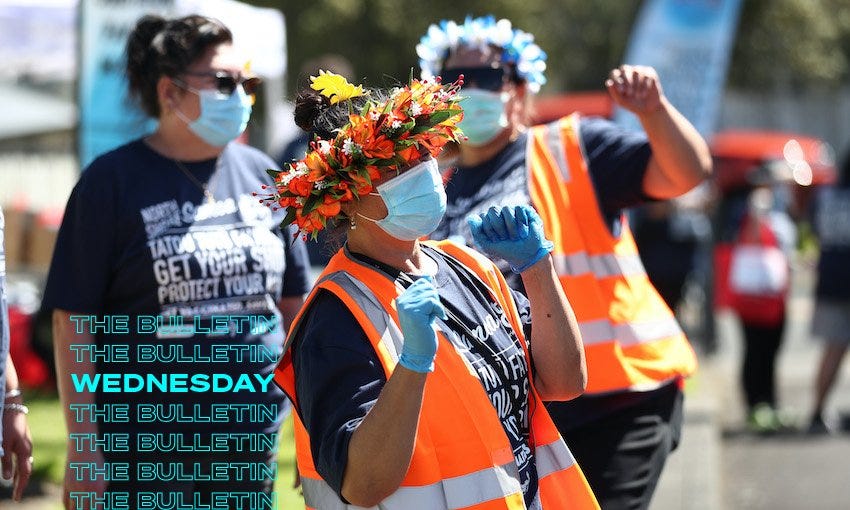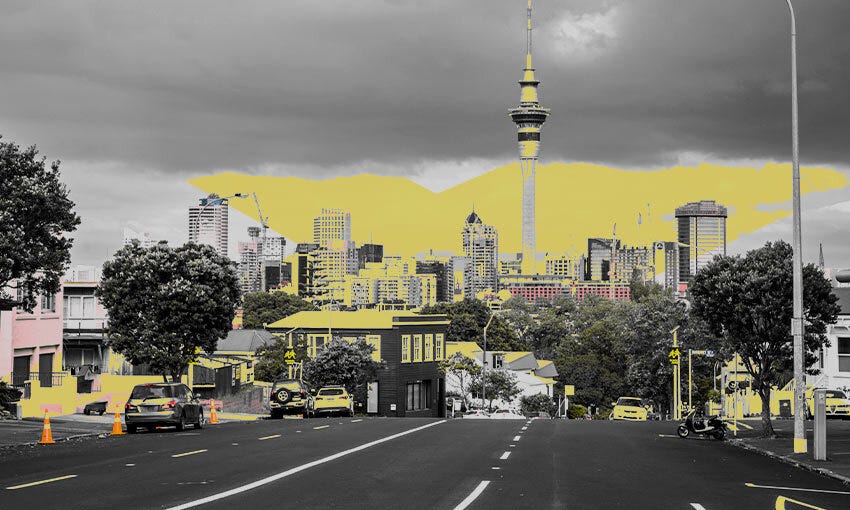The mastermind behind Super Saturday
What began as Tamati Shepherd-Wipiiti’s brainstorm ended up as the biggest day in the country’s vaccination programme
Mōrena and welcome to The Bulletin for Wednesday, October 20, by Justin Giovannetti. Presented in partnership with Z Energy.
In today’s edition: Cross-party bill to end Nimbyism; a record number of Covid cases; red kiwifruit has a new name; but first, how Super Saturday was created.
Staff and volunteers entertain people in Auckland on Super Saturday. (Fiona Goodall/Getty)
The story behind Super Saturday. Three weeks before the most successful day in the country’s vaccination programme, Tamati Shepherd-Wipiiti was at home, surrounded by post-its, unicorns and scribbled notes. The ministry of health manager was trying to figure out a way to get more jabs into Māori arms. He spoke with The Bulletin about how the big event came together.
“For Māori we have a few things that motivate us. We are fiercely protective of our whanau and our whakapapa. Another thing that’s really motivating is competition, we love to compete,” he said.
“As a country we’d done very well with the over 65s. Over 90% vaccinated in nearly all DHBs. I had to ask myself: If ‘protect your whānau’ works for that demographic, what works for 18 to 40-year-olds? It’s competition, it’s sports and it’s a Māori sense of humour. How do we bring those together nationwide? I suddenly thought, ‘Gee, telethon used to be really cool like that.’ We used to get together as a country, could I take that and create a vaxathon?”
Shepherd-Wipiiti is usually a senior health consultant with PricewaterhouseCoopers, but he’s currently on secondment to the ministry of health. His focus is on increasing equity in the country’s vaccination programme. Armed with an idea, he wrote out a one-page concept, shared it with ministers and others in government, and got rapid feedback. They loved it and were willing to fund it. Others may have had similar ideas, but his name is on the plan that became reality.
The deadline was incredibly tight, with an announcement made to the public on October 6. “Usually you have nine months to stand up a telethon, we had 10 days,” he said. Super Saturday was marked as October 16 on the country’s calendars and circled in red ink.
The need for a strong business response. One of the first people to get a call was Rob Fyfe, former head of Air New Zealand and the government’s main conduit with the country’s business community. “I told him there was no way we could do this alone, we need business. He said business will be receptive to any initiative that’ll help get the country open. We started a call out and just had major support, all the big names came forward,” said Shepherd-Wipiiti.
The day quickly morphed into a public-private venture with over $500,000 in donations from industry, along with offers of facilities and help. From a new airliner serving as a vaccination clinic to free KFC, the day became a focal point for New Zealand business. It was a reflection of the small team that brought it together, only four people who themselves represented a merger of business and government.
“I was really surprised with the level of support from private businesses,” said Shepherd-Wipiiti. “It was like we opened a valve and they threw their weight behind the programme. We couldn’t believe what we got. Wow. It’s been tough times for kiwi business but they wanted to be part of it.”
In the end, vaxathon and Super Saturday was a success. Over 130,000 New Zealanders came out for a party and a jab. It was the single biggest day of the vaccination programme for Māori and offered people a splash of entertainment in the middle of gloom, according to Shepherd-Wipiiti.
“We started with: how can we lift our Māori vaccination numbers? And then we thought, if we can make this work for Māori, we’ll make it work for the country. It was fun for everybody,” he said.
“The thing that was really exciting for us was that the health sector has been under a lot of pressure since Covid happened last year. For a lot of them this was a moment to celebrate. Everyone has had a good injection of fun, the element of competition is still there and we want to harness that in the coming weeks to get the job done.”
While another Super Saturday isn’t likely, there could be bigger regional events next month in a final push to get the country’s vaccine programme across the finish line.
Thank you from The Spinoff publisher Duncan Greive: It’s a little overwhelming to be sitting here, a week on from when I wrote my Bernie-esque plea for new members, to write to you about the response. It was instant and humbling. It has been the biggest surge in new sign-ups since the freaky days of April 2020. We also saw many existing members raise their ongoing contributions, which was also hugely impactful.
To be blunt, we needed it. And still do, so if you can join up, or have been meaning to, please do so today. We are still a long way from knowing when this period will end, which means our commercial funds remain highly constrained. We remain highly dependent on our members for everything from live updates, to data visualisation to cultural coverage. But we've had a really heartening week, and the whole organisation is very grateful for it. If you are a member, or have donated—please take a moment to feel the immense gratitude radiating out from all of us here.
Becoming Yimby nation. Labour and National have set aside their differences for a cross-party bill to increase housing density across New Zealand. As Justin Latif reports for The Spinoff, it’s the first time since the 2007 “smacking bill” that both parties have shared the stage for a policy announcement. They’ve now signalled to councils that the housing crisis requires real attention, with legislation allowing nearly all sites to house three homes of up to three storeys each, without requiring a resource consent. Act leader David Seymour came out against it, arguing that it’s not the right fix for housing. As the NZ Herald noted, it’s an odd stance for a libertarian leader who typically doesn’t defend red tape.
A new report finds that a third of households spend more than 30% of their income on housing. The Royal Society Te Apārangi concludes that high housing costs mean budgets for food, electricity and housing are being cut to compensate. For people facing that situation, there won’t be relief in the legislation. Housing minister Megan Woods and environment minister David Parker took pains yesterday to repeat during a press conference that the new housing bill won’t lower housing prices, but is only expected to slow the rate of increase. National’s Nicola Willis described the bill’s impact as one for “the next generation” and that’s how long it might take.
The Covid numbers: There are 38 cases in hospital and 5 in ICU/HDU. There are now 715 active cases in New Zealand. 87 new community cases were reported in Auckland yesterday and 7 in Waikato. 42,793 people were vaccinated on Monday.
The Spinoff’s Covid data tracker has the latest figures.
The country reported a record number of Covid-19 cases yesterday. Sustained heavy case numbers could quickly overwhelm the country’s health care system, The Guardian reports after a record day. Reflecting yesterday’s edition of this newsletter, nearly half of the cases were unlinked to the wider outbreak and the contact tracing system is starting to falter. The virus has now been detected in 124 Auckland suburbs and Waiheke Island. The race is on between vaccinations and Covid’s spread.
Third doses recommended for immunocompromised people. Stuff reports that the ministry of health has approved and recommended a third jab because the immunocompromised may not have produced a sufficiently strong immune response to just two doses of the Pfizer Covid-19 vaccine. These are different from a booster shot for the general population, which could be approved in the coming weeks.
A paid message from our partner Breast Cancer Foundation NZ.
Talking about breasts is important. So important, in fact, we've launched a new podcast series about it—Breast Assured.
In this fun, frank and fascinating series, host Sarah Gandy and her guests dive into all things boobs and discover how important it is to get to know our breasts, learn to look after them and take back ownership of these assets that are uniquely ours.
Listen to Breast Assured on Apple Podcasts, Spotify or your favourite podcast provider.
The RubyRed is joining the SunGold. Zespri’s long-awaited red kiwifruit has a new name and will start its first commercial harvest next year, Farmers Weekly reports. Along with its red colour, the fruit is smaller, has a shorter shelf-life and a “berry-like” taste that appeals to younger consumers. Growers might also be interested because it’ll be cheaper after the cost to license the gold variety is up sharply in recent years.
Got some feedback about The Bulletin, or anything in the news?
Get in touch with me at thebulletin@thespinoff.co.nz
The third month of lockdown for Auckland. (Getty & Tina Tiller)
Right now on The Spinoff: Charlotte Muru-Lanning argues that with the record number of daily cases it’s time for Auckland to go back to level four. Justin Latif reports on anti-alcohol campaigners who want new rules around obnoxious store signs. Stewart Sowman-Lund explains why he'd like another season of The Jacquie Brown Diaries. The Spinoff's fans of Succession write about the return of the show about bad people. Stanley Neville, a lovely dog, has helped write a review of reality show Barkley Manor that also touches on a pupper’s life at the moment.
Football Ferns’ new coach prepares for first match behind the bench. Stuff reports that the team will face reigning Olympic champions Canada on the weekend in Ottawa and issues with New Zealand’s managed-isolation system means that the full squad won’t be on hand. To help fill gaps, the team has found players and staff normally based in the US who can travel north for two games over the coming week. New coach, new players and last-minute help against one of the toughest teams in the world means it’ll be a game worth watching.
That's it for The Bulletin. If you want to support the work we do at The Spinoff, please check out our membership programme.







